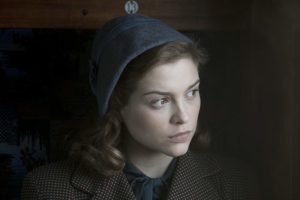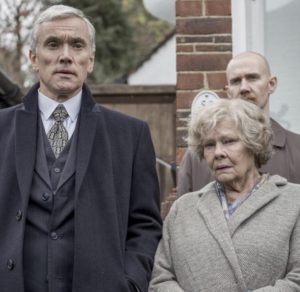Science is pure. A hypothesis is either true or it isn’t and the scientific method can be used, unfailingly, to prove it. Politics and human emotions are another story, as we learn in RED JOAN, a drama of that most potent mixture, love and politics. Based on a true story, it considers questions of loyalty and honesty, and the triumph of idealism over the politics of the moment.
Told in flashbacks, it begins with an ordinary elderly Joan (Judi Dench), tending to her ordinary front garden in a row of ordinary semi-detached houses in suburban England. It’s only when she becomes troubled about the death of a government minister, followed quickly by her arrest by the Special Branch that we realize that this is no ordinary woman. As Joan is questioned about the file that’s been kept on her since 1938, starting with her days at Cambridge as a physics student, that the face of normalcy cracks, and the extraordinary story of a conscious objector of a different stripe is revealed.

Sophie Cookson
1938 Cambridge finds Joan (Sophie Cookson) primly and gamely taking on an area of study reserved for men. Late one night, a stranger taps on her ground-floor dorm room and makes a splashy entrance. Sonia, red lipstick, and redder shoes steps through the window and into Joan’s life, changing it forever. Sonja (Tereza Srbova) is older, worldly, and glamorous. She’s also got a dashing cousin, Leo (Tom Hughes), and a penchant for recruiting people for her Communist cell. As Joan puts it in the present, it was a different time, and the in thing to do, even if the meetings were boring and the films presented not that good. People were, after all, staging public knitting events for civil-war torn Spain. The glamour of the cousins also comes into it, as does that newly deceased government minister, who was also a party member at the time.

Brn MIles, Judy Dench
As the interrogation continues, her life during the war as an unsung nuclear scientist (she’s officially the assistant, read secretary, to Max Davis (Stephen Campbell Moore), who is working on the British equivalent of the Manhattan Project. Her tortured affairs with Leo and Ma come out, the former refusing to commit while also asking her to share secrets with the Brits’ Soviet Allies, the latter married to a woman who refuses to give him a divorce. Details that astonish her barrister son, Nick (Ben Miles), and seem to seal her fate with the government, which is preparing to charge her with treason under the Official Secrets Act.
Before we find out exactly what Joan did or didn’t do, there is the tangled relationships to sort out, including the one in the present with her increasingly discombobulated son. When he demands to know why she never told him about her government work, the sincere reply that she couldn’t because she’s signed the official document not to bemuses him, and us, considering the charges that she is facing.
Dench, a formidable presence on both stage and screen, here combines the spine of steel with a touching innocence, and one perfectly complemented by Cookson’s performance in the color-saturated past. The ethics of Joan’s convictions are consistent, even as the people around her subscribe to a moral relativism at odds with the party lines that they spout. Srobova is striking as the woman who is both completely open and shady at the same time, while Hughes is less compelling that brooding as he reappears in Joan’s life at times that are just a little too convenient.
RED JOAN poses simple philosophical questions, and answers some of them with an argument that is a disconcerting as it is forceful. More concerned with the dialectic than the drama as Trevor Nunn employs a deliberate, but finely observed pacing, it is still an intriguing film about a woman constantly underestimated by everyone but herself.
Your Thoughts?